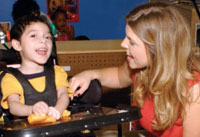 Teaching can be a very difficult and frustrating job, especially for those who are just starting out. Ideally, everyone who begins his or her first year as a teacher does so after receiving an education that will prepare them for any possibility, but the truth is that this is not always the case. Being a truly good teacher takes experience, something that a first year teacher will obviously lack. This is especially true for those who are working in special education. Special education teachers work with students with very specific needs. It’s an area that can be very demanding, and there will be plenty of challenges that teachers simply won’t be prepared to face.
Teaching can be a very difficult and frustrating job, especially for those who are just starting out. Ideally, everyone who begins his or her first year as a teacher does so after receiving an education that will prepare them for any possibility, but the truth is that this is not always the case. Being a truly good teacher takes experience, something that a first year teacher will obviously lack. This is especially true for those who are working in special education. Special education teachers work with students with very specific needs. It’s an area that can be very demanding, and there will be plenty of challenges that teachers simply won’t be prepared to face.
The first year is always the hardest for special education teachers, but that doesn’t mean that the challenges it presents cannot be overcome. If you are just starting out in the field of special education, here are some tips that should help you.
1. Save your Lesson Plans
Most teaching programs strongly advise against coming up with lesson plans on a day-to-day basis, but when you’re just starting out in your teaching career you might not have a choice. You will hopefully have a handful of lesson plans that you can use in the beginning, but as the school year goes by you will need more. As you come up with new lesson plans, save those that are the most effective. Before long, you should have a file of lesson plans you can fall back on.
2. Make Good Use of Rubrics
Using a rubric can be a great way to organize a lesson plan or a special project. It provides guidelines that will keep you and your students on track. Students will know what is expected of them, and they know what to work towards if they want to succeed.
3. Don’t Be Afraid to Be Flexible
As important as organization is in the classroom, you should never be afraid to be flexible. Unexpected situations will arise, and some of your students won’t respond well to your teaching methods. Don’t be afraid to mix up your teaching styles. There’s a reason why rubrics provide guidelines and not specific rules.
4. Ask for Help when You Need It
As we said before, being a truly good teacher takes experience, something you will obviously lack during your first year on the job. Fortunately, your school will have a staff of experienced educators who will be glad to provide advice if you ask for it. Even the best and most experienced special education teachers you meet have been exactly where you are now, and most of them will be glad to help you out.
5. Think in the Short Term
This sounds a little counterproductive, but thinking only about what you need in the short term will save you a lot of stress and grief. It’s tempting to stock up on course materials that you are “absolutely sure” to need throughout the school year, but it’s all too easy to get ahead of yourself by doing this. Take things one week at a time, or even one day at a time if that makes things easier. This will also help you to keep tabs on your budget, something that can become a serious issue for any school or district.
When you are just starting out as a special education teacher, the most important thing to remember is that it will get easier. In time you will learn what teaching styles work best for you, and you will fall into a groove that makes this daunting career look almost simple. Just remember to stay calm, stay positive and don’t give up.
About the Author
Aubrey Roberts has been a special education for ten years and she loves her profession. She has written a Masters in Special Education Program Guide to further help individuals who are interested in a career in this rewarding field.
 Follow
Follow